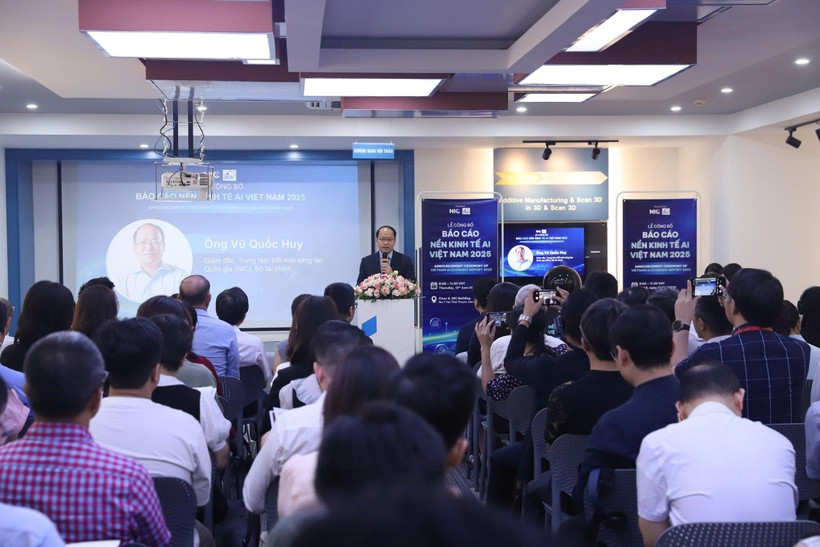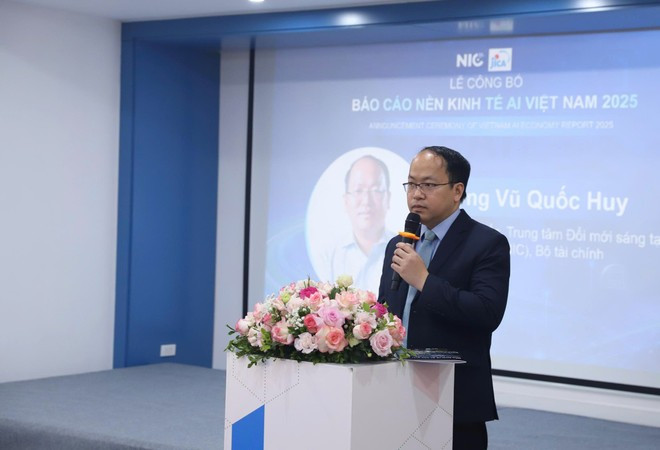
The launch of the Vietnam’s AI Economy 2025 report on June 12. (Photo: VietnamPlus)
Artificial intelligence (AI) is rapidly reshaping the global economy and has become the top priority in digital transformation strategies of governments and leading corporations worldwide. It is projected to contribute up to 5 trillion USD to the global economy by 2030.
The information was revealed in the Vietnam’s AI Economy 2025 report, released on June 12 by the National Innovation Centre (NIC) under the Ministry of Finance, in coordination with the Japan International Cooperation Agency (JICA) and the Boston Consulting Group (BCG).
The report presents in-depth analysis of the current landscape and growth potential of Vietnam’s AI sector, while offering strategic guidance to promote the sustainable development of the AI economy.
Vietnam’s leading priority
To realise Vietnam’s ambition of becoming a regional AI leader, the Government has launched a range of important initiatives. Key among these are Resolution No. 57/NQ-TW and the national strategy for AI research, development and application through 2030 outlined in the Prime Minister’s Decision No. 127/QD-TTg. These documents reflect the Government’s strong commitment to digital transformation and serve as a guiding framework for AI research, development, and application across a wide range of sectors.
According to the report, AI will become a driver of Vietnam's sustainable economic growth, with the AI economy expected to hit 120–130 billion USD by 2040. The two main growth drivers that will enable AI to make a major contribution to the economy are: consumption revenue (45–55 billion USD) from AI-powered products and services, and profit from increased productivity enabled by technological adoption (60–70 billion USD).

In 2024, Vietnam ranked second in Southeast Asia for both the number of AI-focused startups and investment capital. (Photo: VietnamPlus)
In 2024, Vietnam ranked second in Southeast Asia for both the number of AI-focused startups and investment capital. A critical enabler of this growth is Vietnam’s burgeoning digital and IT workforce. Over 150 universities currently offer information technology-related courses, producing more than 60,000 graduates annually. Leading institutions such as the Hanoi University of Science and Technology (HUST) have launched AI undergraduate and postgraduate programmes to meet rising industry demand.
Further bolstering the AI talent pipeline, NIC and Google’s Build for AI Future programme have delivered essential AI training to students at 80 universities and colleges nationwide. These efforts have already made significant strides in raising awareness and equipping young people with key AI skills.
Public interest in AI is also emerging as a strong catalyst for growth. Vietnamese consumers are actively embracing AI technologies in daily life, while business leaders across sectors are showing keen interest in AI-driven innovation.
Three pillars for AI development
To drive AI-led growth, the report offers strategic recommendations based on three core development pillars.
First, it suggests prioritising AI application across both the public and private sectors.
Second, the report calls for support to Vietnam’s emerging AI ecosystem. This includes launching sustainable AI startup accelerator programmes, offering technical and business mentorship, facilitating investment and partnership opportunities, and assisting new enterprises in the domestic market to effectively deploy AI solutions.
Third, it emphasises the need to build a highly skilled AI workforce. This involves designing internationally recognised AI training programmes at undergraduate, postgraduate, and doctoral levels, as well as rolling out large-scaled AI talent development schemes such as Japan’s Global Communication Infrastructure (GCI) initiative.
The report also identifies three supporting pillars to strengthen the foundation of Vietnam’s AI economy: raising public awareness and knowledge of AI, improving high-quality data and computing infrastructure, and developing clear and adaptable policy frameworks.

NIC Director Vu Quoc Huy said Vietnam’s AI Economy 2025 report is the first to provide a panorama of the AI economy in the country. (Photo: VietnamPlus)
NIC Director Vu Quoc Huy said Vietnam is entering a particularly important transition period amid the Fourth Industrial Revolution taking place strongly with new breakthroughs in strategic technologies such as AI, semiconductors, biotechnology, renewable energy, and big data that are reshaping global value chains and changing the structure of economies.
To seize this opportunity, Vietnam is determined to secure a firm foothold in the AI sector by proactively promoting cooperation with other countries, economies, and the world’s tech giants, he said.
The report is the first document to provide a comprehensive overview of the AI economy in Vietnam. It shares international experiences and lessons, analyses opportunities in key economic sectors, and propose development pillars for the national AI economy, Huy added./.
VNA
Source: https://en.vietnamplus.vn/vietnam-leads-region-in-ai-application-with-20-annual-growth-post322139.vnp
 PM directs acceleration of scientific-technological development, digital transformation
PM directs acceleration of scientific-technological development, digital transformation





